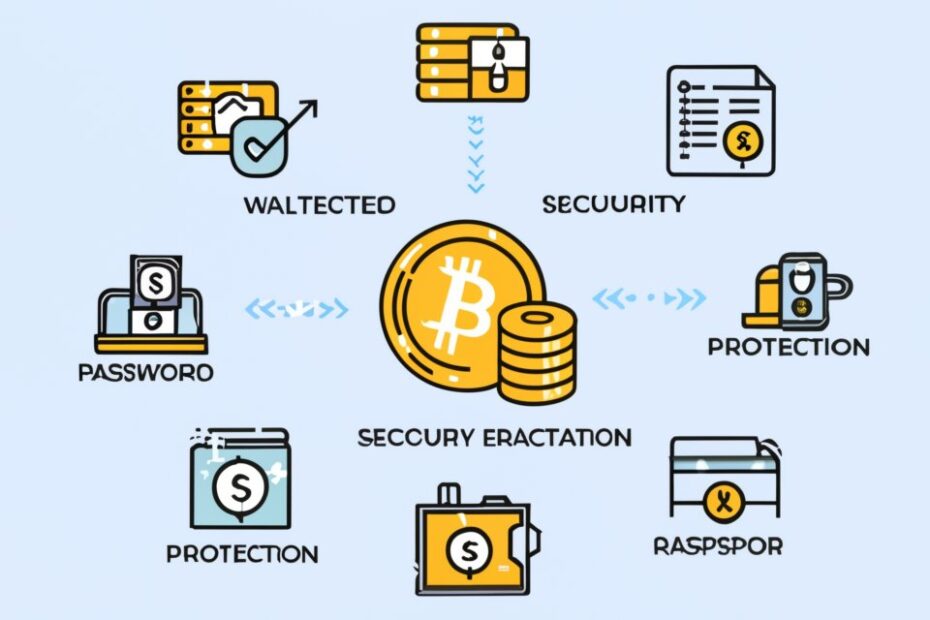Cryptocurrency emerged as a groundbreaking different asset group, opening up new avenues for wealth creation and transferal. Though, the very qualities that render cryptocurrency attractive – lack of centralization, namelessness, and indestructibility – additionally present safety hazards necessitating alert safekeeping of digital properties. This manual investigates supreme practices and gadgets for fastening cryptocurrency contrary to theft and deception.
Preface to Cryptocurrency Security
Cryptocurrency safety denotes the footsteps taken toward shielding cryptocurrency wallets and properties from unauthorized admission, theft, ripoffs and violations. As decentralized digital currencies, cryptocurrencies depend heavily on private keys and wallet technologies to control fund access and conveyance. Minus adequate safety measures, these keys and wallets are vulnerable to assaults. The irreparable nature of cryptocurrency dealings also signifies that stolen funds seldom can be recovered. Stalwart safety is imperative for understanding the possibility of cryptocurrency investing while easing risks.
Understanding Cryptocurrency Wallets
Cryptocurrency wallets store private keys and enable users to receive, store and transfer digital currencies. Wallets come in several forms:
- Hot wallets – Software programs connected to the Internet, allowing users to easily transact while heightening vulnerability to hacking. Examples include web-based wallets and wallets linked to cryptocurrency exchanges.
- Cold wallets – Wallets kept offline in “cold” storage to reduce exposure to network-based attacks. Includes hardware wallets like USB drives as well as paper wallets with keys printed out for storage in a safe location.
- Custodial wallets – Wallets managed by a third-party custodial service that handles security on the user’s behalf. Although convenient, reliance on a custodian introduces centralized points of failure.
How assets are stored through these wallets determines the security protocols required by users. Central to all wallets is protecting private keys that enable transfer of funds.
Password Guidelines for Cryptocurrency
Private keys in crypto wallets should be safeguarded by strong passwords to prevent unauthorized access. Consider these password best practices:
- Generate long, random passwords using a password manager – 12 characters or more mixing letters, numbers and symbols boosts complexity.
- Never reuse passwords across accounts or share passwords with others.
- Enable two-factor authentication (2FA) for additional login protection when available.
- Change passwords periodically, avoiding previous iterations, and store securely offline.
Adhering to excellent password hygiene is a core tenet of personal cryptocurrency security.
Two-Factor Authentication for Cryptocurrency
Two-factor authentication (2FA) requires providing two forms of identity verification when accessing a cryptocurrency wallet or account online:
- Knowledge-based identification, typically through passwords.
- Possession-based verification via email codes, SMS texts, authentication apps or hardware keys.
By combining both “Who you are” and “What you have,” 2FA provides significantly enhanced security, protecting against password leaks. All crypto holders are advised to enable any 2FA options available through the wallet, exchange or platform used to manage assets.
Best Practices for Storing Cryptocurrency
When not actively trading or transacting, cryptocurrency is best kept in cold storage wallets offline, safeguarded from online attacks targeting hot wallets. Every investor should consider these cold storage security measures:
1. Hardware Wallets
Hardware wallets like Trezor and Ledger provide offline storage through encrypted external devices. Keys are generated and stored securely on the detachable device rather than on a computer vulnerable to hacking. Funds can only be accessed and transferred when the hardware wallet is connected.
2. Paper Wallets
For small holdings, do-it-yourself paper wallets allow you to generate and print out private keys. Keys can be stored securely offline while publicly accessible wallet addresses can be shared for receiving transfers. Paper wallets should be generated on clean, offline computers and stored in fireproof safes.
3. Custodial Cold Storage Services
Third-party crypto custody solutions provide institutional-grade security protections including cold storage, multi-signature authorizations and insurance coverage. They provide security beyond most individual DIY efforts. Leading custody providers include Anchorage, Fireblocks and Kingdom Trust.
Taking assets offline in cold storage reduces risks tremendously for long-term holds.
Cryptocurrency Security Risks and Threats
Despite stringent security protocols, lingering risks surround cryptocurrency assets, threatening naive and savvy holders alike.
Hacking Sophisticated cybercriminals conduct advanced hacking methods like phishing, malware, denial of service attacks and consensus manipulation tactics to breach wallets and exchanges – with billions lost to crypto hacking historically.
Scams From fraudulent investment schemes to fake coin offerings, the crypto landscape is rife with scams preying on greedy, unsuspecting investors. Victims rarely obtain restitution. Caveat emptor prevails.
Human Error
Simple security mistakes cause considerable crypto losses, from misdirected copy-and-paste wallet addresses to forgotten private key passcodes. Preventing use errors through safety checklists and backup procedures is key.
While expanding rapidly in sophistication, cryptocurrency security continues to play catch up in thwarting electronic and social engineering threats from this digital Wild West. Cybersecurity should remain top-of-mind for all cryptocurrency investors.
Cryptocurrency Security Tools and Services
Myriad tools and services have emerged to aid cryptocurrency users in securing holdings, including:
Antivirus and anti-malware software – Protects against malware infections seeking wallet and exchange login details. Windows Defender and Malwarebytes offer strong solutions.
VPN connections – Encrypts Internet connections to guard data from cyberattacks when accessing crypto accounts. ExpressVPN and NordVPN are leading options.
Password managers – Automatically generates and stores strong, randomized passwords. Consider 1Password, LastPass and KeePass.
Hardware 2FA keys – Physical tokens for authorization confirmation during account access. Popular options are made by YubiKey,OnlyKey and Titan Security Key.
Security-focused mobile and desktop wallets – Wallets like Exodus, Jaxx Liberty and Mycelium integrate additional security capabilities natively alongside other functionality.
Crypto insurance – New policies from insurers like Coincover, Evertas and Bridge Mutual cover losses from cryptocurrency theft under certain circumstances.
Leveraging these security tools is prudent to boost protection.
Cryptocurrency Security Regulations and Compliance
Government policies surrounding cryptocurrency security compliance remain in flux as regulations evolve. Currently, few formalized regulations exist, besides Anti-Money laundering (AML) and Know Your Customer (KYC) requirements instituted by many exchanges. Security regulations likely will expand to mandate that crypto-related businesses implement consumer protection controls like:
- Secure storage – mandating cold wallet usage
- Investor insurance programs
- Security audits and penetration testing
- Employee background checks
Organizations that proactively boost security now will be better positioned as compliance regulations materialize to stabilize industry growth.
Cryptocurrency Security for Institutional Investors
Large asset managers, hedge funds, banks, and insurance companies increasingly seek exposure to the high-growth crypto asset class for their investment portfolios. But regulatory requirements and reputation risks necessitate robust security well beyond average retail investor norms. Institutional cryptocurrency adoption requires:
- Scale – Asset volumes often run into the billions, requiring enterprise-grade security protocols and infrastructure.
- Compliance – Must satisfy evolving fund security regulations and internal policies.
- Custody – Qualified independent or bank custodians are tasked with asset handling and storage.
- Insurance – Requires coverage for crime-related losses like theft or fraud.
- Governance – Stringent oversight and audit procedures demonstrate effective risk management.
- Partitioning – Storage across cold and hot wallets necessitates careful fund partitioning.
Institutions often outsource security management to crypto custodians like Anchorage Digital bringing this specialized expertise – a prudent choice providing operations teams confidence to onboard crypto assets.
Cryptocurrency Security for Individual Investors
While institutions invest at scale, millions of individuals now also hold cryptocurrency – in 2020 over 10% of Americans held crypto. For more limited holdings, individual investors should still make security a priority by:
- Using reputable exchanges and wallets – Consider user reviews and security track records in avoiding poorly managed providers.
- Storing most assets in cold storage- Hardware or paper wallets keep funds offline.
- Securing keys and seed phrases – Critical credentials enabling fund access must have physical security.
- Practicing good password hygiene – Long, unique passcodes guard against brute force hacking.
- Performing wallet security audits – Periodic checks ensure backup systems and protocols work when needed.
- Monitoring transaction histories – Spotting unauthorized transfers early allows for swift response.
- Learning security best practices – Keeping current as threats evolve protects through knowledge.
While individuals can’t replicate institutional-grade systems, applying these foundational security steps reduces breach risks in a meaningful way.
Cryptocurrency Security and Taxation
Tax liabilities provide another imperative for meticulous cryptocurrency security protocols. Unlike cash transactions, all crypto transactions are eternally recorded on their respective blockchain ledgers. This permanent transparent record ensures regulatory authorities can precisely track capital gains and losses for taxation purposes, provided investors have access to historical transaction records.
Losing wallet keys via lax security precludes access to full transaction histories required for accurate tax accounting and documentation. Locked out investors still remain liable for all taxes owed, accruing penalties and interest on top for any late filings due to missing histories.
Before investing in cryptocurrencies, create a data backup plan ensuring continuous access to complete transaction records even if security breaches occur. Keeping meticulous records unlocks optimal tax planning opportunities while avoiding penalties down the road.
Conclusion: Safeguarding Your Digital Wealth
Revolutionary innovations with cryptocurrencies created opportunities for generational wealth creation. But realizing crypto’s promise necessitates vigilant security consciously designed to combat ever-present threats. Apply the best practice precautions detailed here as a baseline for securing holdings against attack. Seek additional protections like multi-signature authorizations, penetration testing and insurance coverage for more sizable investments.
Ongoing headlines of eight-figure crypto heists make evident that despite great riches made in this emergent asset class, a false sense of security can still result in rapid losses. Avoid becoming another unfortunate victim by taking responsibility to safeguard your growing digital wealth through purposeful design. The solutions are readily available – wisdom lies in prudent application.
Frequently Asked Questions
What are the main security threats surrounding cryptocurrency today?
Hacking, scams, fraud and human operational errors present the biggest security threats to cryptocurrency holders right now. Sophisticated cybercriminals actively target crypto users across these vectors.
Should I use a hot wallet or cold wallet to store cryptocurrency?
Cold wallets like hardware wallets and paper wallets kept offline provide the most secure storage mechanisms for cryptocurrency. Hot wallets offer much less protections but greater transaction convenience.
What happens if I lose access to my cryptocurrency private keys?
Losing private keys effectively eliminates accessibility to cryptocurrency holdings, which still remain recorded on the blockchain. New wallet address links must be created to receive future transfers.
Is cryptocurrency stored on an exchange secure?
Storing cryptocurrency long-term on an exchange poses risks despite security layers in place. Historical exchange hacks have resulted in billions in crypto theft to date. Moving holdings into cold storage wallets is more prudent.
Can I recover stolen cryptocurrency funds?
Trying to recover stolen cryptocurrency is very difficult given blockchain immutability. Monitoring tools aim to track transactions to off-ramps for asset recovery, but most funds are quickly laundered untraceably. Prevention remains imperative.
What is the best way to secure a cryptocurrency wallet?
Using hardware or paper wallets in cold storage provides the strongest security. Hot wallets warrant protections like multi-factor authentication, antivirus software, encrypted Internet connections through a VPN and password manager usage for strength and uniqueness.
Who is responsible for securing cryptocurrency holdings?
As no centralized authority governs cryptocurrency networks, security obligations ultimately fall upon the asset holder, underscoring why following best practices vigilantly remains essential. Seeking trusted custodians can provide institutional-grade security support.

Eric Cook is a cryptocurrency expert and educator who has dedicated his career to teaching others about the intricacies of digital currencies and blockchain technology. He has extensive experience in the crypto industry and has been involved in the development and implementation of various blockchain-based projects.
